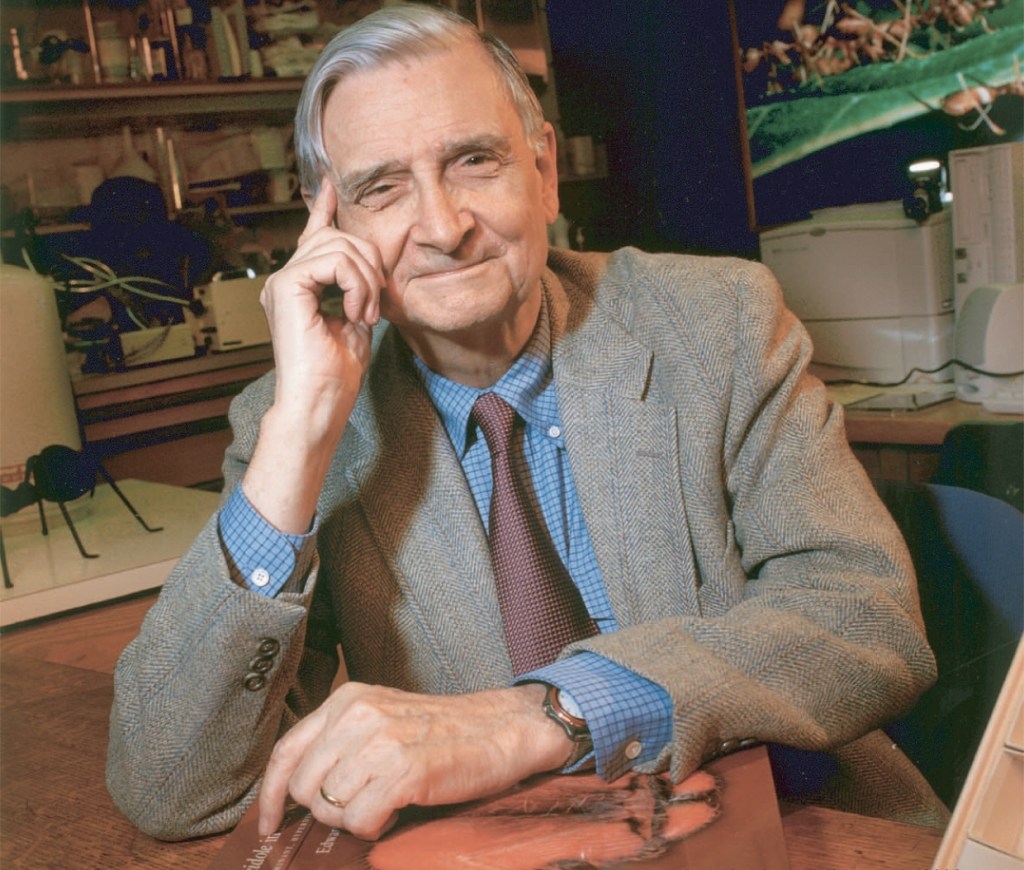In Scientific American, Monica R. McLemore, an associate professor of nursing, tells us that the work of E. O. Wilson, who died on December 26th, is “problematic” because it was “built on racist ideas.” What evidence does she provide? Not much other than a reference to Wilson’s seminal Sociobiology in which he argued that biology played a role in behavior:
His influential text Sociobiology: The New Synthesis contributed to the false dichotomy of nature versus nurture and spawned an entire field of behavioral psychology grounded in the notion that differences among humans could be explained by genetics, inheritance and other biological mechanisms. Finding out that Wilson thought this way was a huge disappointment, because I had enjoyed his novel Anthill, which was published much later and written for the public.
That’s all, folks. The very idea that biology plays a role in how we act is racist. But is it? Wilson himself responded to a similar suggestion 40 years ago. In a letter to Nature, where it was reported that a National Front journal had found evidence for racism in his work, he wrote the following to “keep the record straight”:
I am happy to point out that no justification for racism is to be found in the truly scientific study of the biological basis of social behaviour. As I stated in On Human Nature, “I will go further and suggest that hope and pride and not despair are the ultimate legacy of genetic diversity, because we are a single species, not two or more, one great breeding system through which genes flow and mix in each generation. Because of that flux, mankind viewed over many generations shares a single human nature within which relatively minor hereditary influences recycle through ever changing patterns, between the sexes and across families and entire populations.” If there is a possible hereditary tendency to acquire xenophobia and nationalist feelings, it is a non sequitur to interpret such a hypothesis as an argument in favour of racist ideology. It is more reasonable to assume that a knowledge of such a hereditary basis can lead to the circumvention of destructive behaviour such as racism, just as a knowledge of the hereditary basis of haemoglobin chemistry and insulin production can lead to the amelioration of their pathological variants. (emphasis mine)
After sullying Wilson’s reputation a few days after his death with no evidence whatsoever, McLemore goes on to suggest that scientific journals hire journalists to sift manuscripts for “problematic” ideas before publication because, you know, truth matters.
Whatever one thinks of Wilson’s sociobiology, one should at the very least respond to what he wrote. Rather than McLemore’s silly piece, read Felicia He’s obit in the Harvard Crimson and Rich Lowry’s in the New York Post.
In other news
When one thinks of Henry Ford, one thinks of automobiles. The visionary engineer and entrepreneur all but invented the auto industry when he founded the Ford Motor Co. in 1903. Five years later he manufactured the first affordable car for middle-class Americans, the Model T, having first devised the assembly-line process to mass produce this epoch-making innovation. Few Americans, however, associate the Ford name with agricultural and farm-class vehicles. Yet years before he conceived the Model T, Ford—who was born on a farm near Dearborn, Mich., in 1863—was obsessed with “making some kind of a light steam car that would take the place of horses,” especially, as he later wrote in his memoirs, “to attend to the excessively hard labour” of plowing, threshing and pulling. Nothing, his first-hand experience had taught him, could be “more inexcusable than the average farmer, his wife, and their children drudging from early morning until late at night.” The story of Ford’s dream of perfecting an affordable, all-purpose tractor—or, as Ford later imagined it, a gasoline-powered “automobile plow”—is seldom told. Neil Dahlstrom’s Tractor Wars tells it well.
Livia Gershon provides a list of some of the things that will enter the public domain in 2022, including A. A. Milne’s Winnie-the-Pooh and Hemingway’s The Sun Also Rises.
A musician in Seattle made between $8,000 and $16,000 a year selling CDs at shows in the early 2000s. This year on Spotify, he made $150.
For Thomas Mann in his Reflections of a Nonpolitical Man, Adam Kirsch writes, “the problem isn’t which political side you support; it’s the necessity of choosing a side in the first place. He passionately defends the right to be nonpolitical, arguing that this is the proper stance for the artist and, more broadly, for the German people, whose genius lies in the realm of culture and spirit, not politics.”
Did you have a tad too much to drink last night ringing in the new year? Maybe you should sign one of these temperance pledges.
That Old World style:
In Ravelstein, Saul Bellow’s thinly disguised account of the final years of the University of Chicago professor Allan Bloom, the narrator Chick and his close friend Abe Ravelstein go on a shopping spree in Paris sometime in the 1990s. For all their highfalutin philosophical talk about Athens versus Jerusalem and the like, Bellow makes it clear that there is a Dionysian as well as Apollonian cast to the bond between Chick and Abe. After departing the Hôtel de Crillon, their first stop is Lanvin. There, Abe is smitten by a beautiful flannel jacket retailing for $4,500. He buys it. “You see such jackets advertised in Vanity Fair and the other fashion slicks,” he says, “and they’re usually modeled by unshaven toughs with the look of rough trade or downright rapists who have nothing — but nothing — to do, other than being seen in all the glory of their dirty narcissism.” After visiting Sulka to inspect the custom-made shirts that Abe had previously ordered, the duo seek out the bespoke hat-maker Gelot in the Place Vendôme. Here, Chick finally breaks down and buys a nifty green corduroy fedora. This prompts Abe to comment, “I like the look of it on you. You can do with a little assertion.” Sulka and Gelot are long gone, but in his marvelous elegy Swan Songs, Réginald-Jérôme de Mans vividly evokes a Parisian world of glittering elegance that Abe and Chick could take for granted.

























